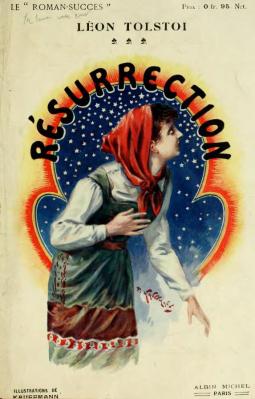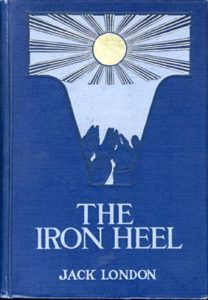 Resurrection (1899)
Resurrection (1899)
By Leo Tolstoy
This late 19th-century novel about nobleman Dmitri Ivanovich Nekhlyudov’s efforts at redemption after a life of sin is Tolstoy’s last major novel before his death in 1910. The readers will have a complex relationship with the tormented protagonist and his desperate attempts at redemption and forgiveness, since Nekhlyudov’s misguided decisions and youthful errors are often not so dissimilar from our own. Resurrection is a scathing exposition of the myriad prejudices of the man-made justice system and the hypocrisy of the establishment, while it also explores the economic philosophy of Georgism – of which Tolstoy had become a strong advocate toward the end of his life. [from the Culture Trip]
Political Economy Book Club discussions are open to everyone interested, without charge, and the text (in English translation) is available free from various sources including archive.org, who also offer a free audiobook. There is also a more recent translation by Anthony Briggs, which can be purchased or licensed in various formats and is available in some public libraries. Any questions about the PEBC may be directed to Convenor Bob Matter,
Between 1948 and 1973, Americans’ real wages rose almost as fast as their productivity. After 1973, productivity grew 147% but wages rose only 19%. This raises two questions:
(1) If workers getting less, who is getting more?
(2) Is there a way to restore the balance?
To solve the problem of poverty, and the many other problems that follow from it, ordinary workers need higher wages. George Menninger describes how to raise wages without interfering in the free market and without taking anyone’s earnings.
George Menninger is an instructor at the Henry George School of Chicago, and attendees at this free program will have the opportunity to sign up for his Progress & Poverty course.
You can sign up for this free event thru Eventbrite, or RSVP directly by email.
If you want to understand the underlying causes of persistent poverty in America, you’ll benefit from this course. This is the “modern” version, based on Bob Drake’s “Abridged for Modern Readers” edit of Henry George’s original book. As always, the first class session is entirely free, but if you decide to enroll in the course we request a $25 fee to help cover costs. Veteran HGS instructor Bob Jene will help you understand not only the causes of economic stagnation, but a workable remedy.
This course will meet for six consecutive Friday’s beginning January 6. Our space at Overflow Coffee Bar is directly served by CTA routes 62 and 29, and a reasonable walk from Red, Green, and Orange Line Roosevelt station, as well as Metra Electric’s Museum Campus and 18th Street stops.
Between 1948 and 1973, Americans’ real wages rose almost as fast as their productivity. After 1973, productivity grew 147% but wages rose only 19%. This raises two questions:
(1) If workers getting less, who is getting more?
(2) Is there a way to restore the balance?
To solve the problem of poverty, and the many other problems that follow from it, ordinary workers need higher wages. George Menninger describes how to raise wages without interfering in the free market and without taking anyone’s earnings.
George Menninger is an instructor at the Henry George School of Chicago, and attendees at this free program will have the opportunity to sign up for his Progress & Poverty course.
No reservation is required, but you can let us know by email that you’re coming.
Between 1948 and 1973, Americans’ real wages rose almost as fast as their productivity. After 1973, productivity grew 147% but wages rose only 19%. This raises two questions:
(1) If workers getting less, who is getting more?
(2) Is there a way to restore the balance?
To solve the problem of poverty, and the many other problems that follow from it, ordinary workers need higher wages. George Menninger describes how to raise wages without interfering in the free market and without taking anyone’s earnings.
George Menninger is an instructor at the Henry George School of Chicago, and attendees at this free program will have the opportunity to sign up for his Progress & Poverty course.
No reservation is required, but you can let us know by email that you’re coming.
 Bob Matter’s Political Economy Book Club is reading Jack London’s dystopian novel The Iron Heel. On June 25 we’ll discuss chapters 1-13, and on July 23 chapters 14-25. This 1908 text is available free from Project Gutenberg, in hardcopy from some public libraries, or as an audiobook. You can buy used hardcopies for < $10 from several vendors.
Bob Matter’s Political Economy Book Club is reading Jack London’s dystopian novel The Iron Heel. On June 25 we’ll discuss chapters 1-13, and on July 23 chapters 14-25. This 1908 text is available free from Project Gutenberg, in hardcopy from some public libraries, or as an audiobook. You can buy used hardcopies for < $10 from several vendors.
We’ll meet at the East Loop location of Bridgeport Coffeehouse, 73 E Jackson Blvd.
 Bob Matter’s Political Economy Book Club concludes its discussion of Jack London’s dystopian novel The Iron Heel. On July 23 we treat chapters 14-25.
Bob Matter’s Political Economy Book Club concludes its discussion of Jack London’s dystopian novel The Iron Heel. On July 23 we treat chapters 14-25.
We’ll meet at the east loop location of Bridgeport Coffee, 73 E Jackson.
